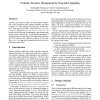Free Online Productivity Tools
i2Speak
i2Symbol
i2OCR
iTex2Img
iWeb2Print
iWeb2Shot
i2Type
iPdf2Split
iPdf2Merge
i2Bopomofo
i2Arabic
i2Style
i2Image
i2PDF
iLatex2Rtf
Sci2ools
113
click to vote
MOBISYS
2003
ACM
2003
ACM
Predictive Resource Management for Wearable Computing
Achieving crisp interactive response in resource-intensive applications such as augmented reality, language translation, and speech recognition is a major challenge on resource-poor wearable hardware. In this paper we describe a solution based on multi-fidelity computation supported by predictive resource management. We show that such an approach can substantially reduce both the mean and the variance of response time. On a benchmark representative of augmented reality, we demonstrate a 60% reduction in mean latency and a 30% reduction in the coefficient of variation. We also show that a history-based approach to demand prediction is the key to this performance improvement.
Related Content
| Added | 24 Dec 2009 |
| Updated | 24 Dec 2009 |
| Type | Conference |
| Year | 2003 |
| Where | MOBISYS |
| Authors | Dushyanth Narayanan, Mahadev Satyanarayanan |
Comments (0)

